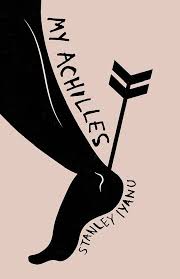REVIEW: STANLEY IYANU’S ‘MY ACHILLES’
By Stella Backhouse

Its title suggestive of both identification and vulnerability, Stanley Iyanu’s 2023 pamphlet My Achilles celebrates popular poetry’s role in both revealing the inner reality of outwardly unremarkable lives and emotions, and situating them within a framework every bit as epic as that chronicled by ancient myth. Documenting the highs and lows of a gay love story, My Achilles also draws on imagery of food and eating to convey the sensuality of everyday life; and of the cosmos with its many constellations named for Greek heroes, to reiterate the significance of individual experience even when played out on the vastest of canvases.
The pamphlet is divided into four sections, each one named for a character of the Achilles myth: the warrior Achilles himself, his companion Patroclus, his mother Thesis (or Thetis) and his nemesis, Hector. Between them they tell a story of self-recognition and falling in love; being in love; life after love. Starting with the awakening desire evident in ‘Lasagne’ and its cheeky guidance on cooking mince (“turn up the heat a touch/allow it to sizzle/soaking in its juices/watch as it stiffens”), it’s hard not to embrace the clarity of Iyanu’s self-acceptance over a bowl of washing up and the joy of his emerging romance; or to commiserate with his desolation when love ends. For me, however, the love poetry of the ‘Patroclus’ section was less impressive than the smattering of other poems about family and the disorientating experience of growing up Black in contemporary Britain. Periodically interrupting the otherwise linear progression, these are the poems that provide depth and context.
The juxtaposition of ‘Citrus Fruit’ and ‘weird + wonderful’ illustrates the pull and push tension at the heart of Iyanu’s Nigerian/British and queer identities. In ‘Citrus Fruit’ Iyanu’s dislike of his father’s favourite mangoes serves as a metaphor for carving out his own path through life in the teeth of parental expectation. In ‘weird + wonderful’, on the facing page, Iyanu has overcome the shame he once felt to take pride in his identity, pointing out to himself that although “you are not the boy you once were”, “your heart remains the same/that boy so gentle and tender/is a man now”.
The poem that perhaps best encapsulates the themes of personal significance through self-knowledge is ‘Little Lagos’. Here, Iyanu recalls a now-demolished Lagos dance hall where he was taken at the age of five. Although he had “never seen a space/that big”, he quickly began to enjoy the atmosphere and how it “felt like home”. Sadly, the dance hall is now demolished and Iyanu can revisit it only in his dreams. But when he awakens, he is content to find himself in a big comfy bed. This is a collection that despite navigating a difficult path involving many challenges, ultimately finds its resting place.
My Achilles can be purchased online, direct from publisher Burning Eye Books for only £6.99 and from other retailers.
